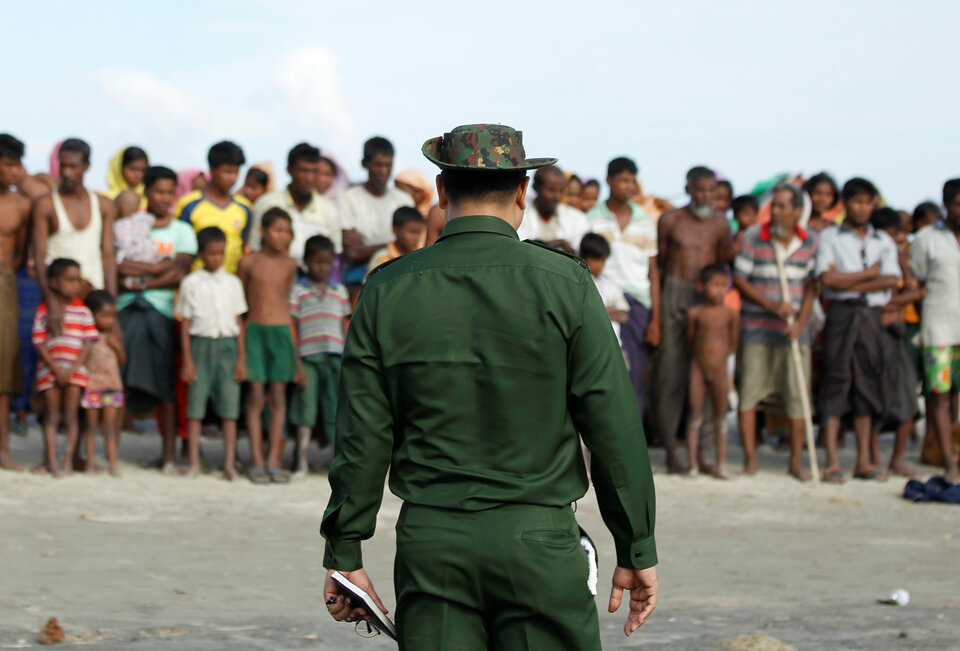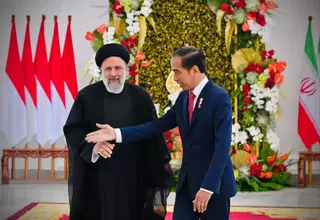Political Willingness, Human Rights Approach Key to Resolving Rohingya Crisis: Amnesty International

Jakarta. Resolving the humanitarian and human rights crisis in Rakhine State must be accompanied by a political willingness from the Myanmar government to address it from a human rights perspective, an Amnesty International researcher told the Jakarta Globe.
"As long as the Myanmar government refuse to recognize the level of segregation [and] discrimination, it’s going to be very difficult. [They] must address this situation from the human rights perspective," Elise Tillet, Amnesty International researcher for Myanmar, said on Tuesday (21/11).
The UK-based rights group concluded, after a two-year investigation in the troubled region, that Myanmar authorities’ treatment of the Rohingya amounts to apartheid.
"We are seeing crimes against humanity on a regular basis in Rakhine State, not just the past three months, but on a daily basis for the past five years," Tillet added.
The report – entitled "Caged Without a Roof" – shows that the Myanmar government has denied the Rohingya’s right to citizenship, restricted their freedom of movement, violated their economic and social rights and excluded them from political and social life from the rest of Myanmar.
Prejudice against the Rohingya is widespread across the Southeast Asian country, and is often perpetuated by Myanmar authorities.
Tillet said that Aung San Suu Kyi, as Myanmar's de facto leader and state counselor, must speak up against the hatred and discrimination.
"One of the things we hope from Aung San Suu Kyi [is that she] would come out and speak against these discrimination, and call for tolerance among Myanmar society. This is something that she has the power to do, and that if not her, I’m not sure who else could be that voice within Myanmar," Tillet said.
Tillet is part of the team who conducted research for the report, which included field trips to Rakhine State and over 200 interviews.
Indonesia, Asean and the International Community
Amnesty International also said that Indonesia can play a unique role to help resolve the situation in Rakhine State.
"Indonesia should push Asean [Association of Southeast Asian Nations] to actually give any answer to the situation, because Asean as a regional bloc has been shamefully silent so far," Tillet said.
On Wednesday, Amnesty International presented their recent report to Sidarto Danusubroto, a presidential advisory board member.
"We are asking the Indonesian government to use all diplomatic channels they have to the Myanmar government to remind them that this is not about development and security, but about restoring human rights and dismantling a system of apartheid," Tillet said.
Much of the international assistance provided to address the crisis has largely focused on aspects of security and development. In this case, Indonesia can help push the human rights agenda, she added.
Tillet is also scheduled to hold meetings with officials from the Ministry of Foreign Affairs, the National Commission on Human Rights (Komnas HAM) and the National Commission on Violence Against Women (Komnas Perempuan).
She told the Globe that the group tried to schedule a meeting with the Asean Secretariat, but did not receive a response.
Asean member states, including Myanmar, uphold policies of non-interference in each other's domestic affairs.
The rights group also urged the international community to continue pressuring Myanmar to dismantle apartheid in the country and allow humanitarian aid to northern Rakhine State.
"We also think that all governments and the United Nations Security Council should impose an arms embargo against the Myanmar military," Tillet said.
The Myanmar institutions that have perpetuated the entrenched system of discrimination and restrictions are still under the control of Myanmar military, she said.
Furthermore, Asean and the UN Security Council should impose targeted sanctions against individuals who are responsible for the crimes against humanity taking place in the region.
Repatriation
Attacks by insurgents on the military in late August led to a violent crackdown, triggering a mass exodus of more than 600,000 Rohingya to neighboring Bangladesh.
The potential return of the refugees to Rakhine State has been the subject of political dialogues regarding the crisis, with a memorandum of understanding between Myanmar and Bangladesh central to this possibility.
The Rohingya are denied citizenship and regarded as illegal immigrants from Bangladesh, despite claiming roots in Myanmar that go back centuries.
Tillet emphasized that the Rohingya should not be pushed against their will nor should they return to a situation of violence, segregation and discrimination.
She also said that Bangladesh needs to continue what they are doing, which has been a practice of receiving those who fled the violence and allowing those who fled to stay as long as necessary.
"Myanmar's government has a legal obligation to allow those who wish to return in safety and dignity, it must ensure they do not go back to a system of apartheid where they can face violence [...] where human rights is not respected and restored," Tillet said.
Myanmar said that the agreement would follow the framework of a repatriation agreement from 1992 between Bangladesh and Myanmar. However, the old agreement also pose a number of issues, such as requiring Rohingya to prove their residency and citizenship.
The two countries are still amid negotiations.
The requirements, if they remain, showcase an "unrealistic request," Tillet said, especially because Myanmar authorities have actively revoked all forms of documentation for the Rohingya.
Tags: Keywords:POPULAR READS
Apple Wants to Increase Investments in Vietnam
Vietnam has become more important to Apple as the company seeks to diversify its supply chains away from China.China’s Top Diplomat Wang Yi to Visit Indonesia for Cooperation Talks
Chinese top diplomat Wang Yi will chair a policy coordination meeting aimed at strengthening Indonesia-China cooperation.President Jokowi Urges Global Restraint as Tensions Rise in the Middle East
President Joko "Jokowi" Widodo emphasized the importance of diplomatic efforts to prevent the escalation of conflict in the Middle EastKPK Identifies Sidoarjo Regent as Suspect in Corruption Probe
KPK has identified Ahmad Muhdlor Ali as a suspect in a corruption case involving the Sidoarjo Regional Tax Service AgencyEconomic Concerns Overshadow Security Worries for Indonesians in Iran
Indonesian citizens currently in Iran are more concerned about rising inflation than the security situation in the country.Popular Tag
Most Popular






















